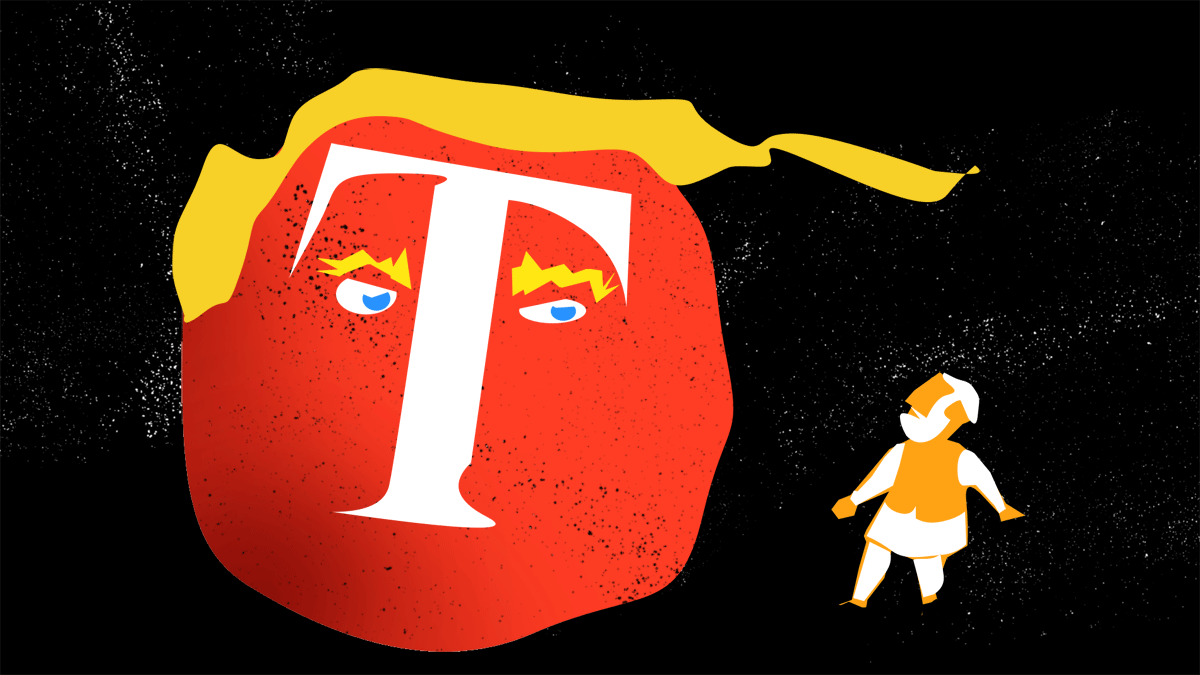‘If the near-term economic pain is absorbed more by those who have the ability and the financial strength to do so, then small and medium enterprises in downstream industries will emerge stronger from the trade imbroglio.’

Illustration: Dominic Xavier/Rediff
As the additional US tariffs on India came into effect, the finance ministry on Wednesday said the immediate impact of the move may appear limited but its secondary and tertiary repercussions on the economy pose challenges that must be addressed.
‘Setbacks eventually make us stronger and more agile, if handled properly,’ the finance ministry said.
‘If the near-term economic pain is absorbed more by those who have the ability and the financial strength to do so, then small and medium enterprises in downstream industries will emerge stronger from the trade imbroglio.
‘Now is the time to demonstrate an understanding of national interest.’
The ministry, in its monthly economic review for July, said that while the near-term risks to economic activity remain due to tariff-related uncertainties, the government and the private sector, acting in tandem, can keep the disruptions to a minimum.
Stressing that the ongoing India-US trade negotiations will be crucial, the finance ministry said India is actively pursuing a diversified trade strategy to sustain its resilient trade performance.
The monthly economic review by the Department of Economic Affairs (DEA) said the government is holding free trade agreement (FTA) negotiations with the US, European Union, New Zealand, Chile, and Peru.
These are in line with the global shift towards diversification and strategic realignment.
These initiatives, however, will take time to show results and may not fully address the shortfall in exports to the US owing to the current tariff move, the finmin review said.
‘In the dynamic global trade landscape, India has adopted a calibrated approach to negotiating FTAs, aiming to expand market access while protecting domestic interests,’ the review said.
The US administration early Tuesday pressed through with its plan to impose a 50 per cent tariff on Indian goods.
The US department of homeland security notified that an additional 25 per cent levy, linked to India’s oil purchases from Russia, would take effect from August 27.
‘The government is proactively managing risks and seizing opportunities by strengthening domestic capacity, promoting exports, diversifying supply chains and securing alternate import sources,’ the monthly economic review added.
In July 2025, India’s total exports recorded a growth rate of 4.5 per cent over the corresponding month last year, driven primarily by a 12.7 per cent year-on-year (Y-o-Y) growth in core merchandise exports.
The review highlighted that India’s recent sovereign credit rating upgrade by S&P Global Ratings to ‘BBB-‘ would reduce the borrowing costs, attract greater foreign capital and widen the access to global capital markets.
The move would also boost disposable income, reduce inflationary pressures, cut input costs for businesses, and support growth.
The review said that, going ahead, the robust macroeconomic fundamentals continue to bolster resilience of the Indian economy.
It added, ‘Building on the growth momentum gained during Q1 of FY26, the Indian economy continues to reflect resilience in July 2025.’
The finmin report highlighted the recent initiatives such as creation of a task force for next-generation reforms and planned rollout of a fresh set of goods and services tax (GST) reforms.
These, it said, would enhance economic growth amid the challenging global landscape.

Feature Presentation: Ashish Narsale/Rediff



